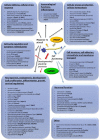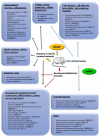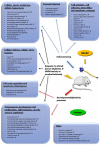Review on PACAP-Induced Transcriptomic and Proteomic Changes in Neuronal Development and Repair
- PMID: 29596316
- PMCID: PMC5979407
- DOI: 10.3390/ijms19041020
Review on PACAP-Induced Transcriptomic and Proteomic Changes in Neuronal Development and Repair
Abstract
Pituitary adenylate cyclase activating polypeptide (PACAP) is a neuropeptide with widespread occurrence and diverse biological effects. Among its several different effects, of special importance is the action of PACAP on neuronal proliferation, differentiation and migration, and neuroprotection. The neuroprotective mechanism of PACAP is both direct and indirect, via neuronal and non-neuronal cells. Several research groups have performed transcriptomic and proteomic analysis on PACAP-mediated genes and proteins. Hundreds of proteins have been described as being involved in the PACAP-mediated neuroprotection. In the present review we summarize the few currently available transcriptomic data potentially leading to the proteomic changes in neuronal development and protection. Proteomic studies focusing on the neuroprotective role of PACAP are also reviewed and discussed in light of the most intriguing and promising effect of this neuropeptide, which may possibly have future therapeutic potential.
Keywords: PACAP; development; neuropeptide; neuroprotective; neurotrophic.
Conflict of interest statement
The authors declare no conflict of interest.
Figures



Similar articles
-
Pituitary adenylate cyclase-activating polypeptide (PACAP) stimulates the expression and the release of tissue plasminogen activator (tPA) in neuronal cells: involvement of tPA in the neuroprotective effect of PACAP.J Neurochem. 2011 Dec;119(5):920-31. doi: 10.1111/j.1471-4159.2011.07486.x. Epub 2011 Oct 24. J Neurochem. 2011. PMID: 21919910
-
PACAP as a neuroprotective factor in ischemic neuronal injuries.Peptides. 2015 Oct;72:202-7. doi: 10.1016/j.peptides.2015.08.006. Epub 2015 Aug 11. Peptides. 2015. PMID: 26275482 Review.
-
Neurotrophic and neuroprotective effects of pituitary adenylate cyclase-activating polypeptide (PACAP) on mesencephalic dopaminergic neurons.J Neurosci Res. 1998 Dec 1;54(5):698-706. doi: 10.1002/(SICI)1097-4547(19981201)54:5<698::AID-JNR15>3.0.CO;2-5. J Neurosci Res. 1998. PMID: 9843161
-
Bone morphogenetic protein down-regulation of neuronal pituitary adenylate cyclase-activating polypeptide and reciprocal effects on vasoactive intestinal peptide expression.J Neurochem. 2007 Feb;100(3):603-16. doi: 10.1111/j.1471-4159.2006.04293.x. Epub 2006 Dec 1. J Neurochem. 2007. PMID: 17181550
-
Pituitary adenylate cyclase activating polypeptide in the retina: focus on the retinoprotective effects.Ann N Y Acad Sci. 2010 Jul;1200:128-39. doi: 10.1111/j.1749-6632.2010.05512.x. Ann N Y Acad Sci. 2010. PMID: 20633141 Review.
Cited by
-
Recent Uses of Lipid Nanoparticles, Cell-Penetrating and Bioactive Peptides for the Development of Brain-_targeted Nanomedicines against Neurodegenerative Disorders.Nanomaterials (Basel). 2023 Nov 23;13(23):3004. doi: 10.3390/nano13233004. Nanomaterials (Basel). 2023. PMID: 38063700 Free PMC article. Review.
-
Effects of electroacupuncture on bladder dysfunction and the expression of PACAP38 in a diabetic rat model.Front Physiol. 2023 Jan 9;13:1008269. doi: 10.3389/fphys.2022.1008269. eCollection 2022. Front Physiol. 2023. PMID: 36699677 Free PMC article.
-
Multimodal Role of PACAP in Glioblastoma.Brain Sci. 2021 Jul 28;11(8):994. doi: 10.3390/brainsci11080994. Brain Sci. 2021. PMID: 34439613 Free PMC article. Review.
-
The Protective Effects of Endogenous PACAP in Oxygen-Induced Retinopathy.J Mol Neurosci. 2021 Dec;71(12):2546-2557. doi: 10.1007/s12031-021-01846-2. Epub 2021 Apr 24. J Mol Neurosci. 2021. PMID: 33895966 Free PMC article.
-
Circulating PACAP levels are associated with altered imaging measures of entorhinal cortex neurite density in posttraumatic stress disorder.Eur J Psychotraumatol. 2024;15(1):2335793. doi: 10.1080/20008066.2024.2335793. Epub 2024 Apr 8. Eur J Psychotraumatol. 2024. PMID: 38590134 Free PMC article.
References
-
- Jolivel V., Basille M., Aubert N., de Jouffrey S., Ancian P., Le Bigot J.F., Noack P., Massonneau M., Fournier A., Vaudry H., et al. Distribution and functional characterization of pituitary adenylate cyclase-activating polypeptide receptors in the brain of non-human primates. Neuroscience. 2009;160:434–451. doi: 10.1016/j.neuroscience.2009.02.028. - DOI - PubMed
-
- Pirger Z., Krajcs N., Kiss T. Occurrence, distribution, and physiological function of pituitary adenylyl cyclase-activating polypeptide in invertebrate species. In: Reglodi D., Tamas A., editors. Pituitary Adenylate Cyclase Activating Polypeptide —PACAP. Springer; Cham, Switzerland: 2016. pp. 19–31.
-
- Egri P., Fekete C., Denes A., Reglodi D., Hashimoto H., Fulop B.D., Gereben B. Pituitary adenylate cyclase-activating polypeptide (PACAP) regulates the hypothalamo-pituitary-thyroid (HPT) axis via type 2 deiodinase in male mice. Endocrinology. 2016;157:2356–2366. doi: 10.1210/en.2016-1043. - DOI - PubMed
-
- Kanasaki H., Oride A., Tselmeg M., Sukhbaatar U., Kyo S. Role of PACAP and its PACAP type I receptor in the central control of reproductive hormones. In: Reglodi D., Tamas A., editors. Pituitary Adenylate Cyclase Activating Polypeptide—PACAP. Springer; Cham, Switzerland: 2016. pp. 375–387.
-
- Garami A., Pakai E., Rumbus Z., Solymar M. Pituitary Adenylate Cyclase Activating Polypeptide—PACAP. Springer; Cham, Switzerland: 2016. The role of pacap in the regulation of body temperature; pp. 239–257.
Publication types
MeSH terms
Substances
LinkOut - more resources
Full Text Sources
Other Literature Sources

